KK Split Celebrates Impressive 74:65 (42:40) Upset over Mega Soccerbet Belgrade
March 19, 2021 - KK Split continues to ride a wave of success in the ABA league!
It has only been 4 weeks since coach Mile Karakaš took over his position on the sidelines from Ivica Skelin but what a difference he has made so far. Before today’s game, the Split basketball team was to be looked for somewhere in the middle to bottom third in the tables of their competitions.

Burak Canboy
However, a fresh wind is sweeping through between the walls of Sports Center Gripe lately. In the Croatian Premijer Liga, the team from Split has risen to the second rank behind Zadar and with this evening’s 7th win in the last 9 games, they have made quite a statement in the ABA league.
This week the ABA league was all over the news after dismissing three referees for their weak performance during Saturday’s Cibona-Buducnost game. KK Split however created some good news today and promoted the sport with an impressive upset against the highly favoured team from Belgrade. Mega Soccerbet Belgrade had decided the first meetup of the two on December 6th with 91:75. The topscorer back then was Filip Petrušev with a dominating 31 points.
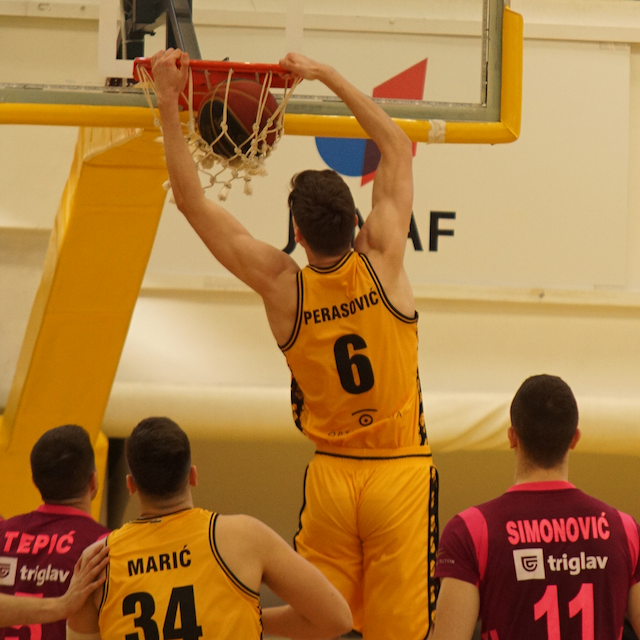
Burak Canboy
The “Yellows” plan however was to ignore Belgrade’s top scorers’ performance and concentrate on keeping all other players from getting into the game. Not only did they succeed in keeping the guests at 65 points but they also were able to contain Petrušev to 22, while Roko Ukić was able to put in 29 points for the winning side.
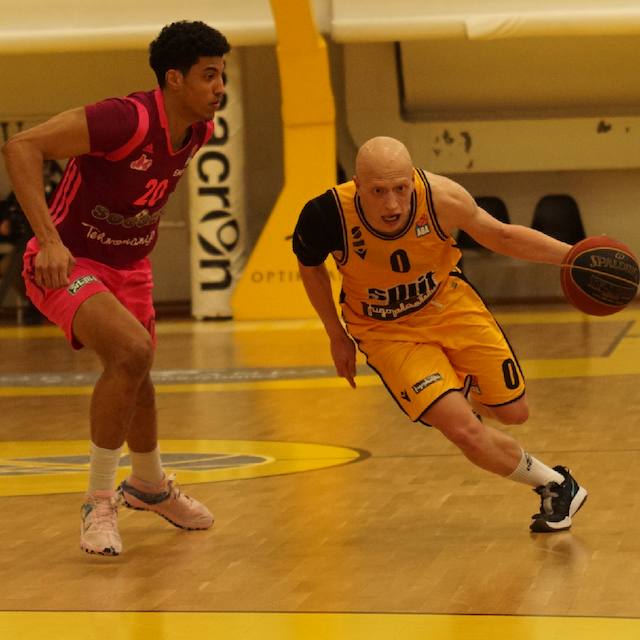
Burak Canboy
The game was close for most parts and both teams were keeping the other at arm’s length. While the guests from Serbia were clearly better when it came to field goal percentage and rebounds they failed to score from the perimeter. Only two of 22 3-point attempts were successful. The hosts on the other hand sank 12 of their 32 attempts and were able to enforce 21 turnovers while only losing the ball 11 times themselves.
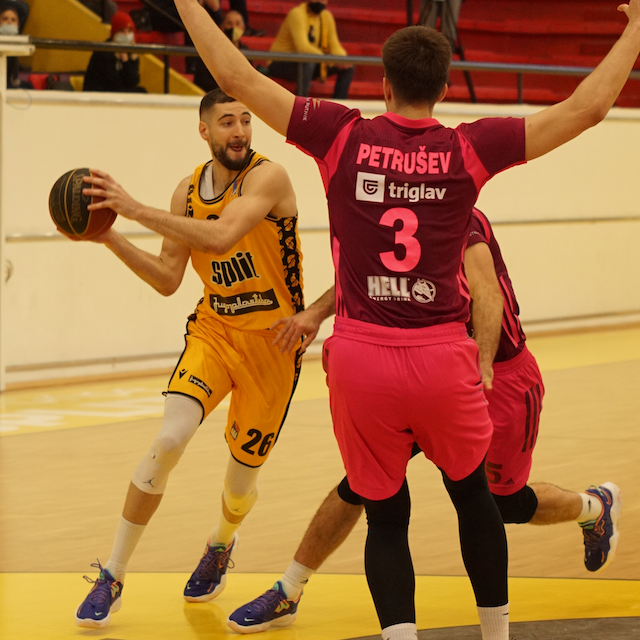
Burak Canboy
After a close first half, both teams picked up the intensity during the third quarter, and during the fourth quarter Split made the decisive shots and was able to lock down Belgrade to 8 points. The victory allows them to take a deep breath and gives them hope that they will be able to leave the fight against relegation very soon
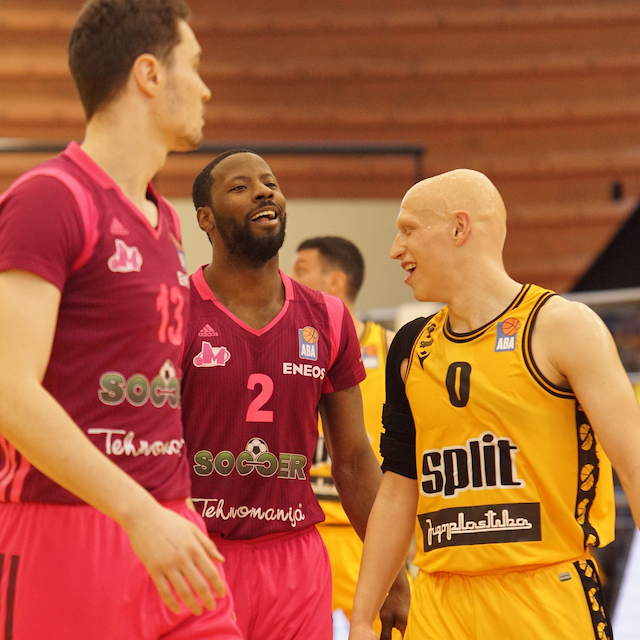
Burak Canboy
ABA League
20210319 16:00
S.C. Gripe
KK Split Mega Soccerbet Belgrade
Results by Quarters
Q1 24:30 Q2 18:10 Q3 18:17 Q4 14:8
KK Split
Top scorers:
Ukić R. 29
Luković M. 16
Đoković I. 11
Marčinković P. 9
Coach: Mile Karakaš
Mega Belgrade
Top scorers:
Petrušev F. 22
Simonović M. 15
Jović N. 10
Matković K. 6
Coach: Vlada Jovanović
Referees: Sašo Petek, Uroš Nikolić, Bojan Kruljac
Full Boxscore available HERE.
To read more about sport in Croatia, follow TCN's dedicated page.
Quake Damage Done to Cultural Heritage in Central Croatia Estimated at €640 Million
ZAGREB, 19 March, 2021 - Damage done to listed buildings and monuments in the quake-hit Sisak-Moslavina County has been estimated at €400 million, while the total damage done to cultural heritage in all the quake-hit areas of Croatia is put at €640 million.
These figures were presented on Friday after Culture Minister Nina Obuljen Koržinek met the task force for dealing with quake aftermath in Sisak-Moslavina County for the talks on registering the damage to cultural heritage.
Obuljen Koržinek informed the task force of the next steps to be taken including urgent measures for the protection and preparation of documentation for the reconstruction of individual listed buildings and monuments.
Reconstruction will be such that it will preserve all the features of the area, however, (listed) buildings will also be renovated to be quake-resistant and energy efficient, the minister said.
Yesterday, we estimated the damage to cultural heritage at €640 million, with just over €400 million in Sisak-Moslavina County and just over €200 million in the nine other affected counties. As far as listed buildings in Petrinja alone are concerned, the damage done to them is estimated at more than €100 million, said Minister Obuljen Koržinek.
For more about earthquakes in Croatia, follow TCN's dedicated page.
Croatian National Bank: "45% of Croatia's Citizens Support Euro Adoption"
ZAGREB, 19 March, 2021 - The percentage of Croatian citizens who support the adoption of the euro in February this year has reached 45%, up by four percentage points from 41% in a previous survey, conducted in March 2020, the Croatian National Bank (HNB) said on Friday.
The fourth public opinion poll on the adoption of the euro was carried out for the HNB by the Ipsos agency from 23 February 2021 to 1 March 2021.
Nineteen percent of citizens are against the adoption of the euro, while 26% are either against or in favour depending on other factors, and 10% of the respondents do not know, the HNB said.
Also, they said, an increasing number of citizens think that the effect of the euro will be positive. Some of the advantages they see include easier payment and business, as well as the fact that the euro is the common currency in the euro area, which would make Croatia equal to other members of the monetary union.
On the other hand, they see a decline in the standard of living and purchasing power as the main risk, and over a third of citizens think that the adoption of the euro will further increase prices.
To date, the poll has been carried out four times: in August 2018, in February 2019, in March 2020 and in February 2021. The survey is conducted on a nationally representative sample of 1,000 respondents, aged 18 to 79, using computer-assisted telephone interviewing (CATI), and it covers four thematic units: the use of the euro in the Republic of Croatia by foreign citizens, how informed citizens are on the adoption of the euro, citizens' attitudes to the adoption of the euro and their expectations.
The aim of the survey is to determine whether Croatian citizens support the strategic commitment of the government and the HNB to adopting the euro as the official currency in Croatia and whether they are aware of all the benefits that the adoption of the euro will bring to them and the national economy.
For more about business in Croatia, follow TCN's dedicated page.
Man Arrested for Murder of Seven Vukovar Civilians during 1990s War
ZAGREB, 19 March, 2021 - A 50-year-old man has been taken into custody following an extensive operation by the police, state attorney and the security-intelligence agency (SOA) on the suspicion of torturing and killing seven Vukovar civilians during the Homeland War in September 1991.
The suspect and members of his paramilitary unit are believed to have punched, kicked and hit with their rifle butts a group of seven civilians, aged between 24 and 55, whom they found in the basement of a house in Vukovar.
The perpetrators then led the captured civilians to the city centre, killing six on the way, while a 55-year-old prisoner was wounded.
After that, the suspect and the other paramilitaries returned to the house and collected the women and children staying there whom they also wanted to take to the city centre but were stopped by an unidentified Serb army officer. The women and children and the wounded 55-year-old man were returned to the basement, however, the next day the 55-year-old was killed by an unidentified Serb paramilitary.
The police reported that after the reintegration of the Danube region an exhumation was conducted and six of the murdered civilians were identified. A 27-year-old man from that group is still unaccounted for.
The suspect was taken into custody while the Osijek County Attorney's office has filed criminal charges against him for war crimes against civilians.
For more about the war in Croatia, follow TCN's dedicated page.
Luka Modrić and Mislav Oršić Named UEFA Players of the Week!
March 19, 2021 - Croatian footballers Luka Modrić and Mislav Oršić were brilliant in UEFA competitions this week, earning them Player of the Week recognitions!
What a week it was for Croatian football and footballers.
Mislav Oršić played a fantastic match in the sensational Dinamo comeback against Tottenham on Thursday night at Maksimir Stadium in Zagreb.
Praise came from all sides; even the great Gary Lineker congratulated Oršić on the hat-trick after the game.
"Blimey. Spurs have blown it. No words... other than to say what a hattrick from Mislav Orsic."
Oršić's 10/10 match not only brought Dinamo a historic result and spot in the Europa League quarterfinals, but UEFA recognized the 28-year-old as the Europa League player of the week!
In the selection, Oršić surpassed the star of Ajax, David Neres, Romino Borja Mayoral (former Real player), and Gerard Moreno, the great, 35 million euro Villarreal striker, against whom Dinamo will meet in the quarterfinals.
"Goals? They mean a lot to me. I didn't sleep all night because of the adrenaline; I couldn't close my eyes," Oršić said the day after the game.
The masterclass of Luka Modrić and his age-defying skill didn't go unnoticed against Atalanta on Tuesday in Real Madrid's 3:1 victory. So much so that the 35-year-old was named the Champions League player of the week!
Luka was the assistant for Real's leading goal and played a significant role in the deserved Madrid win.
SPORTBible couldn't go without praising Modrić either, sharing a compilation of the Croatia captain ruling Atalanta.
"Goals from Karim Benzema, Sergio Ramos and Marco Asensio ensured Atalanta would exit the competition at the round-of-16 stage.
But Modric stole the show as he scooped the Man of the Match award thanks to a dazzling performance in Europe's elite club competition.
The 35-year-old Croatian midfielder rolled back the years as he pulled the strings from the midfield, setting up Benzema for Madrid's opener in the first half.
Modric's show-stealing performance wasn't unnoticed by fans, who took to social media to laud him for his brilliance on the pitch," said SPORTbible.
Luka Modrić vs Atalanta pic.twitter.com/2ykTN5ohg7
— Thiago ? (@HMDComps) March 16, 2021
Bravo to Luka and Mislav!
To read more about sport in Croatia, follow TCN's dedicated page.
Advantages of Euro Currency Significant but Economy Needs to be More Flexible
ZAGREB, 19 March, 2021 - Croatia will enter the euro area on 1 January 2023 at the earliest, and introducing the euro has a number of advantages but for those advantages to be greater the economy needs to be more flexible, including with regard to the labour market, a conference heard on Friday.
The conference, focusing on the introduction of the euro as the official currency in Croatia, was organised by the students' association Financial Club.
Croatian National Bank (HNB) Governor Boris Vujčić said in his opening remarks that Croatia cannot enter the euro zone before 1 January 2023.
"Whether Croatia will enter the euro area on 1 January 2023 or a year or two later, depends on when it will meet the nominal convergence criteria," said Vujčić, recalling that in July 2020, Croatia entered the European Exchange Rate Mechanism II (ERM II), a sort of waiting room for the euro.
He explained that the ERM II envisaged a minimum two years of participation in it so that a candidate aspiring to join the euro area can meet the nominal convergence criteria (Maastricht criteria). On the other hand, if it does not satisfy the criteria, which refer to the stability of the exchange rate, prices and interest rates, the budget deficit and the level of foreign debt, a country can remain in the ERM II indefinitely, Vujčić said.
He recalled a survey indicating that citizens fear that with the introduction of the euro the standard of living will deteriorate and prices will increase. However, surveys in countries that have already introduced the euro indicate that prices increased by 0.23 percentage points on average in the year when the euro was introduced, mostly for everyday goods such as coffee. Prices of such products are relatively lower so their increase could have been relatively high due to rounding off.
"That left the impression in public that prices increased more than they did," explained Vujčić, underscoring that the standard of living did not fall in any country that introduced the euro but rather it improved.
Ćorić: Biggest advantage to companies exporting to euro area
Minister of Economy and Sustainable Development Tomislav Ćorić said that it was clear that citizens would not start living better on the first day of introducing the euro, however, what points to better prospects was the fact that the macro environment in the euro area was free of risks that non-member countries were faced with.
The risk premium in all countries that entered the euro area has dropped, said Ćorić, noting that that was something that in normal circumstances should bring benefits to Croatia, such as reducing yields on long-term security instruments and lower interest rates on commercial and consumer loans.
Considering, however, that we live in "fairly radical economic times," and a period of very low interest rates, the effects which countries that entered the euro area some ten years ago had would be somewhat lower, however, they would still be significant, he said.
The advantages are potentially biggest for export-oriented companies considering that the exchange rate risk will be eliminated, he said.
Ćorić said that the project for euro introduction was not an end in itself but was primarily a very good tool for Croatia's long-term economic growth and development.
Mačkić: Flexibility of labour market, final goods and services market
President Zoran Milanovic's economic adviser, Velibor Mačkić, conveyed the president's message saying that it was necessary to discuss the benefits and potential harm of Croatia joining the euro area.
Mačkić believes that Croatia has not developed its own institutions sufficiently and that that poses a problem. "The country needs a different economy, a much more flexible economy, to be able to benefit more significantly from the monetary union," said Mačkić.
He added that the labour market and the market of final products and services need to be more flexible.
Mačkić underlined the importance of an efficient fiscal policy and of the reform of the tax system which Mačkić believes needs to change from "a consumption-based to income-based tax system."
For more about business in Croatia, follow TCN's dedicated page.
Parliament Amends Law to Ban Large-Scale Hydraulic Fracturing
ZAGREB, 19 March, 2021 - The Croatian parliament on Friday supported by a majority vote amendments to the Act on Hydrocarbon Exploration and Exploitation enhancing the transparency of those processes, with public participation, and banning large-scale hydraulic fracturing.
The amendments define more precisely procedures related to all oil mining activities and prevent the overlapping of more investors in a single area conducting different activities.
For the sake of development and use of renewable energy sources, Croatia's geothermal potential will be promoted by authorising the Hydrocarbon Agency to carry out exploratory activities and establish a development company promoting the development and use of geothermal potential.
Large-scale hydraulic fracturing is banned as a risky and dangerous activity, even though other exploratory activities using the fracturing method are still allowed.
Hydraulic fracturing is a well stimulation technique involving the fracturing of bedrock formations by a pressurised liquid. The process is used to recover gas and oil from shale rock and is very controversial and questionable from the point of view of environmental protection and preservation.
The parliament also amended by a majority vote the Act on Road Transport which defines the co-financing of public road transport, notably bus lines in rural areas.
The cancellation of nonprofitable bus lines in some areas, notably those that are sparsely populated, makes normal life for citizens more difficult and the situation has been additionally worsened by the coronavirus pandemic, which is why the government decided to ensure co-funding for public passenger road transport.
The amended law also exempts taxi drivers who have provided that service under earlier regulations from the obligation of having to pass a professional competence exam.
The parliament also amended the Act on the Security of Sea Ships and Ports under which all ports must have security assessments ready.
The parliament adopted a national programme for the protection of consumers for the period from 2021 to 2024, a strategic document designed to enhance the efficiency of market supervision and better consumer information and education.
MPs also unanimously supported the establishment of an office for projects of the World Meteorological Organisation in Croatia.
For more about politics in Croatia, follow TCN's dedicated page.
Tena Šimonović Einwalter Elected Public Ombudswoman
ZAGREB, 19 March, 2021 - Lawyer Tena Šimonović Einwalter is the new Public Ombudswoman, the Croatian parliament decided on Friday by secret ballot.
A total of 115 MPs voted for her election, while the other candidate, lawyer Sandra Hančić, received the support of one MP, Deputy Speaker Željko Reiner said.
Šimonović Einwalter, elected for a term of eight years, was since 2013 a deputy to Public Ombudswoman Lora Vidović, whose term expired on 1 March and who did not apply for re-election.
Five candidates had applied for the post, and after one candidate was eliminated for not having complete documentation, the remaining four were interviewed and Šimonović Einwalter and Hančić were proposed to the parliament.
For more about politics in Croatia, follow TCN's dedicated page.
Croatian Competition Agency Praised by Both Ruling and Opposition MPs
ZAGREB, 19 March, 2021 - The performance of the Croatian Competition Agency (AZTN) in 2019 was praised on Friday by lawmakers from both the ruling majority and the Opposition.
The report about the agency's activities in 2019 shows that the regulator settled 772 cases that year. The AZTN Council vice-president Vesna Patrlj today informed the parliament that while the agency was receiving more and more cases, it was faced with a decrease in the headcount.
In late 2019, it employed 52 workers and now it has two fewer employees.
"Wages are very low, while the work is very complex, and the training of employees takes some time," Patrlj said in her response to SDP lawmaker Andrea Marić who asked how highly educated people could be motivated to work in this regulator.
In 2019, the regulator issued HRK 4 million in fines and established the existence of two cartels, that is unlawful alliances of rivals, which is considered to be anti-competitive behaviour. The cartels were detrimental to consumers, Patrljsaid without specifying.
In one of the two cases, a user reported this unlawful association and in the other case, the regulator detected it after the participants in the cartel boasted of it in media statements.
Patrlj also called for promotion of the culture of market competition.
For more about politics in Croatia, follow TCN's dedicated page.
International Poetry Day Croatia: Non-Croatian Poets about Croatia
March 21, 2021 - In honour of International Poetry Day Croatia, TCN's Ivor Kruljac met with non-Croatia poets to share their views on Croatia through their art.
Since 1999 and the 30th General conference of UNESCO, March 21 is recognized as International Poetry Day. As said by the United Nations official website, the date was dedicated to poetry to celebrate „one of humanity’s most treasured forms of cultural and linguistic expression and identity“, which history remembers practiced in every culture on every continent.
„Poetry reaffirms our common humanity by revealing to us that individuals, everywhere in the world, share the same questions and feelings“, states the UN.
Supporting linguistic diversity and an opportunity of endangered languages to be heard within their communities along with encouragement to bring back the oral tradition of recitals, the promotion of poetry teachings and poetry in the media, as well as connecting this ancient art form with other art forms such as music, painting, and theatre, are all goals of the International Poetry Day. And here at TCN, we want to do our part and connect poetry with what we always struggle to report on: Showing all aspects of Croatia.
To the fans of contemporary poetry, it's no secret that poets today are very much alive, productive, and regularly present their work. If not in books then at poetry events, open-mics, and on social networks – either from their private accounts, blogs, or in groups dedicated to this wordy-art.
We asked non-Croatian poets through social networks and private group chats dedicated to poetry who either visited Croatia or know about Croatia to send us poems about Croatia with a promise that the top 5 will be published and authors presented. Now, to be fair, while the author of this article is a poet, that is far from being a legitimate poetry critic and the rest of the TCN's editorial team (at least to public knowledge) aren't even poets. The idea was to pick the poems based on how it resonates with us as individuals who gave the art a chance. The academic acknowledgment is nice, but resonating with the audience, the everyday people, should be the goal of any art publically displayed, right?
To be honest, there wasn't really any competition as, by the end of the deadline, we received only four poems. Nonetheless, the beauty of these poems and great resonation with TCN was there and we are happy to publish these poems and ranked them, from fourth place to the very best. You can decide for yourselves which poem you like best (and the messages you see in their work), but here the four poems that „knocked on the doors of our mailbox“ (metaphorically, quite poetically, speaking).
#4: „Croatia“ by Jesus McFridge
Poets such as Charles Bukowski and Walt Whitman are very well known by their name, but just as in many other arts, poets are no exception in sometimes preferring to use pseudonyms to present their work while keeping their identity unknown and privacy secured. Such is the author that goes by the name of Jesus Mcfridge. Quite active in a Facebook group Poetry Criticism For Cool Cats, he revealed in his application that he is from California and described himself as a „24-year-old American that watches too much television“. He added that his knowledge of Croatia is limited to the country at the 2018 FIFA World Cup, but he has fallen in love with the Croatia national football team's checkered uniforms. Despite never visiting Croatia, after „Croatia's tragic loss in the 2018 World Cup final“, he found himself also crying just as many Croatians did.
„In this poem, I have attempted to capture the feeling of this tragic loss that we have shared together, despite the vast seas that separate us“ concluded Mcfridge in his application.
His bittersweet poem simply titled „Croatia“ indeed brings some painful memories but presented in a short and funny way allows us to look at the past in a brighter way, bring back smiles, and give us the strength to cheer for our Croatia national team as they prepare for the next trophy hunt.
Croatia
They
Almost won
The world cup
But
Mandzukic scored
An own goal.

Jesus Mcfridge © Jesus Mcfridge
#3 „Daniela's song“ by Christian Sinicco (English translation by Daniela Sartogo)
Christian Sinicco was born in Trieste, Italy, and his poetry is published in various anthologies and magazines and an editor of the magazine Argo with which he has dealt with the widest overview of poetry in the Italian dialect from 2000 to the present day. He published three books of poetry: „Passando per New York“ (Lietocolle, 2005), „Ballate di Lagosta“ (CFR, 2014) and „Città esplosa“ (Galerie Bordas, 2017). He won the first Italian Slam Poetry Championship and served as the president of the slam poetry association LIPS - Lega Italiana Poetry Slam (2013-2014) and is the current vice president of Poiéin. He is also active in a global initiative of slam poets organizing the world slam championship which early results can be followed on Twitch.
He participated in numerous book festivals including four festivals in Croatia: Zagreb Contemporary Poetry Festival, Forum Tomizza (in Umag), Pula Book Fair, and Rijeka Book Fair.
His second book of poetry „Ballate di Lagosta“, translates as Lastovo Ballads and it's actually a preview while Sinicco plans to soon publish the full book dedicated to this beautiful Croatian island on the southern coast.
„I was on Lastovo several times. I know a poet from there, Marijana Šutić and I spent a vacation there with other poets such as Ivan Šamija and Silvestar Vrljić“, said Sinicco in his application where he offered a poem from „Lastovo ballads“ which already seen its presentation on a prestigious literary site Versopolis.
„Daniela's Song“ may not bring out the most visual and most explicit Croatian motives, but the discrete and specific localization of Croatia is there all wrapped in a love poem to touch the heart and help us remember the summer sweethearts and romance in Croatia.
Daniela's song
I.
She talks about how beautiful it is without knowing where to go
perhaps into the water of the sun like her cheek
simply necessary as the wet dream
in a wider galaxy if it can be understood,
she seduces you through valleys and dusty vineyards
with eyes towards the bay with the waterfall:
Za Barje the sign said, and so also barked the dog tied
under the cypress – his teethed mouth was the buried reason
the fishermen had left him there – near a house
covered with ivy and blackberries, in which had grown
an apple tree with sour fruits and roses
that only you will taste:
avoiding the asphalt and dirt road holes you followed Daniela
targeting yourself and the asphyxia of your life
that follows the path to erect the intelligence of the species
that on the concept of work has built its republic of theft,
then you saw her dancing on the beach between the warm rocks
and the boat pulled out of the lobster pot, the fishermen are back:
good and evil are triangles of waves that spread
on the sea towards the two islands where we swam
– the fish are not aware of it,
and so the man under the pine and his child
with the mask, another fisherman with the fishing line,
only you maybe on the petals you bite as the words
II.
after quite a while we are outdoors and eat figs
at dusk time on this meadow
sliced on the wooden bowl,
we take the bread and tear it many times
because paradise is close to the fire
and the village to our left rises white in pink
made with scales like the barracuda
Korčula has no intention to leave our sight
I shouted as my usual self
you lit the candle and made me notice
we are not alone, but you can stay calm
slowly also the hut
and its fire have become attractive
calming the natural tension
of a darkening sky, not preventing us
from tasting the happiness
of a grilled fish, of tomato and capers
you are attractive when you smile
with a glass of water on the lips
too quietly they get up,
wanting to be born in the response they seek outside
the people at the tables next to us, and from the cottage
where they grill they come to clear up
a woman and the cook, as in a ceremonial
we ask for the check with the hands
they will be intertwined when we emerge from the field
toward the parking lot where we’ll get in the car
and head out to the highest point
of a series of bends, before descending to the valley
the vault of stars surprises us
we stop everything, propped on pillows of a land
that is still hot, we’re sure
that the star will fall, and it comes true
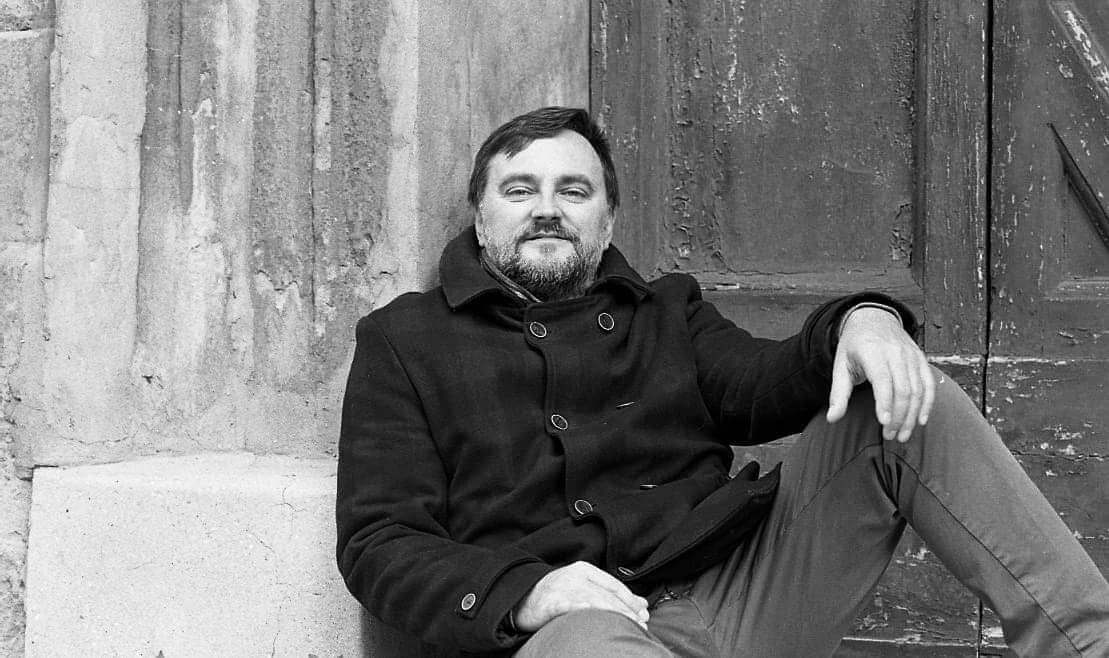
Christian Sinicco © Daniele Ferroni
#2 „The Lakes of Plitvice“ by Vanni Schiavoni (English translation by Graziella Sidoli)
Born in Manduria, Italy, but living in Bologna, Vanni Schiavoni published five poem collections: "Nocte" (1996), "The Suspended Balcony" (1998), "Of Humid and Days" (2004), "Salentitude" (2006), and "Walnut Shell" (2012). He also published two novels "Like Elephants in Indonesia" (2001) and "Mavi" (2019) and edited the poetic anthology "Red - between eroticism and holiness" (2010). Most recently, he also published poetical plaquette „Croatian Notebook“ which features twelve poems dedicated to six Croatian sites: Plitvice Lakes, Kornati, Šibenik, Trogir, Split, and Dubrovnik. Schiavoni wrote the "Croatian Notebook" after a week-long journey in the summer of 2017. His birthplace Manduria is located in the region of Puglia which is 30 miles away from the Pelagosa (Palagruža), the most distant Croatian island, and his surname originates from the name of the Slavonia region in Eastern Croatia.
„For me, it was not just a holiday trip but a journey in and out of everything that I am, a travel diary through which to bring out the game of mirrors between me and that place, between what I am and where I come from and what I have encountered“, said Schiavoni. This journey impacted him with images of the signs of Italy engraved in stone, mournings of the war, communist history („most heretical Communist party in the east in front of the largest Communist Party in the west“, as Schiavoni puts it) and as he added, „the same Adriatic Sea which gives both of us fishes and earthquakes“.
His poem „The Lakes of Plitvice“ is a lovely description of the mixture, the game, and visual eye-candy of the waters in Croatia's oldest National Park, and it linked with a search for bravery and the encouraging point that good and beauty can defeat evil and change it to something better.
THE LAKES OF PLITVICE
The first day they always plunge down into the same spot
the river rapids that come to the encountering
of the white river with the black river
and the more we think ourselves ready with our shrewd eyes
the fewer the adjectives made available to us before that wonder:
the green rush pushes our pupils towards a wild frenzy
it pushes them inside the tearful torrents by our feet
in the shrouded darkness of the sequential caves
and in the vertical caverns sculpted
as if by a hand capable of it all.
Yet Judas must have passed by this place
and though perhaps not the one with burning lips
a simple Judas must have become lost
in this mysterious grid of remorse.
These lakes fall into lakes as lashings on yielding branches
they flow into other waters and so they rain
endlessly
and perfectly untouched.
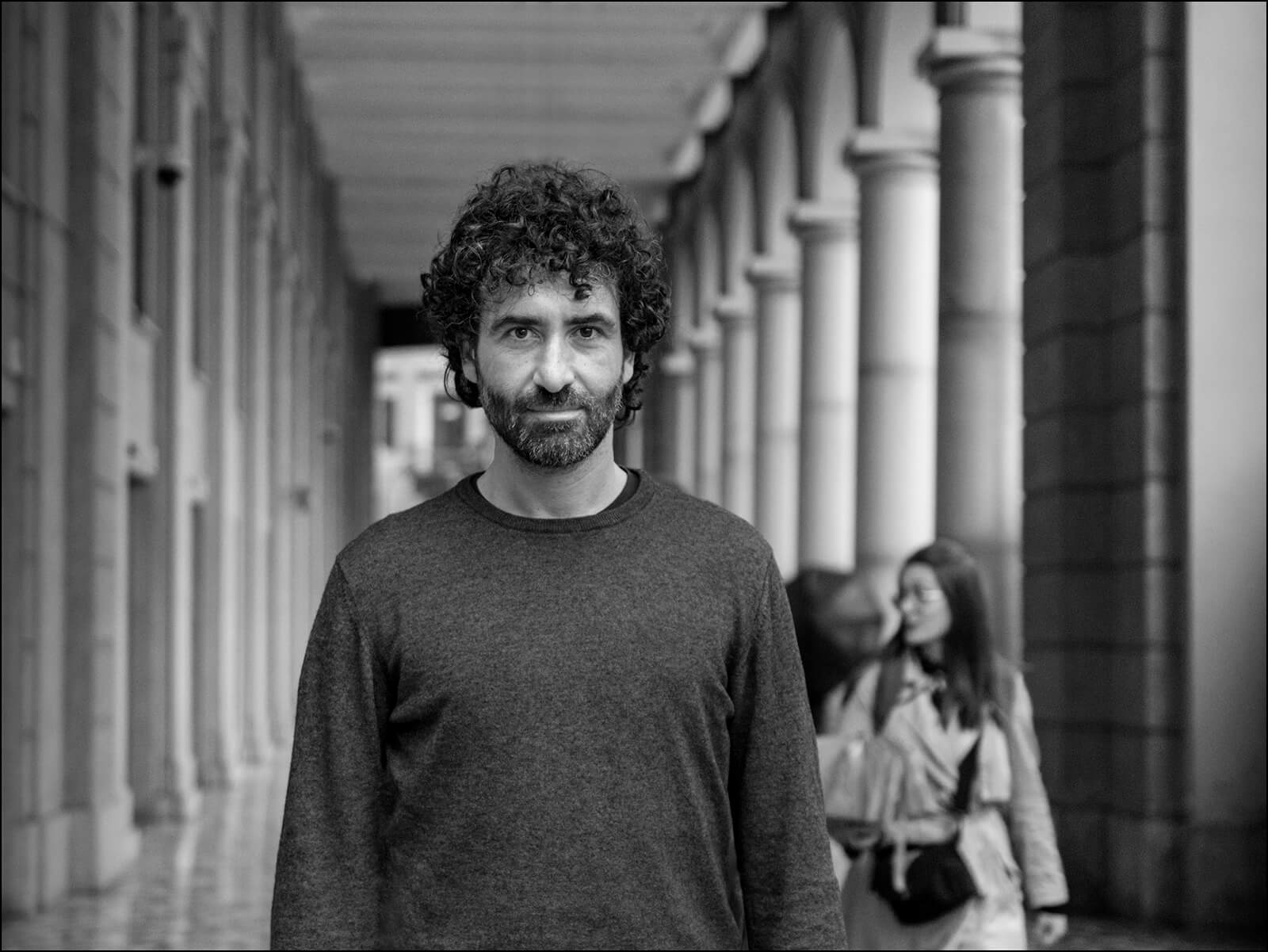
Vanni Schiavoni © Dino Igmani
#1 „Dubrovnik Rock“ by William Vastarella
After Schiavoni and Sinicco, our first-ranked poet is the conclusive evidence there is something so incredible about Croatia it really inspires poetically-inclined neighbors across the Adriatic. Born in Napoli in 1974, William Vastarella is a teacher of Italian Literature, geography, and History. He's has a Ph.D. in semiotics from the University of Bari and writes for several literary and cultural magazines in Italy. He also edited several poetry anthologies as well as semiotic essays. Vastarella visited Croatia several years ago and had a cultural and relaxing holiday on the seaside. „I found her so full of the Mediterranean spirit that I wrote a poem in Italian. I tried to translate it in other words, trying to leave intact the sounds of that memory“, said Vastarella about his poem on Dubrovnik.
The poem „Dubrovnik Rock“ is fantastic in the way, Vastarella visually invokes the images from the history of Dubrovnik (Ragusa) Republic and the relationship it had with Italians at that age with the waves of the Adriatic Sea as the link between Italy and Dubrovnik but also between past and present.
Dubrovnik Rock
Other singers claim to feel
singular vibes in the waves
Nearby this shore,
and so do I.
Ragusa, Dubrovnik
A name is not enough
To trap a soul.
I ask myself
Who’s the other side
Of the other side
As the seawater shuffles.
I touch with my finger
and now I know it’s real
the steel and the wood of the boat
powerful works of man
that wipe out weapons
and I ask no more.
I realize
we have been both
pirates and emperors
centurions and barbarians
through the centuries
each one to the other
a flurry flow
of slavers and Slavs,
slayers and saviors.
Sometimes when the north wind blows,
melting the white in waves,
painting clouds of amazing blues
mirroring the water in the sky,
space seems to become so narrow,
so easy the neighborhood,
then all
the voices of the ancient age
of an ancient game
of thousands lost
in that spot of time,
that spot of sea,
mutate in a mute roar singing
in which merge the rage of riot
and the call for help of a lot
castled in the rock
waiting for a drop of rain to drink
or friend sails on the horizon.
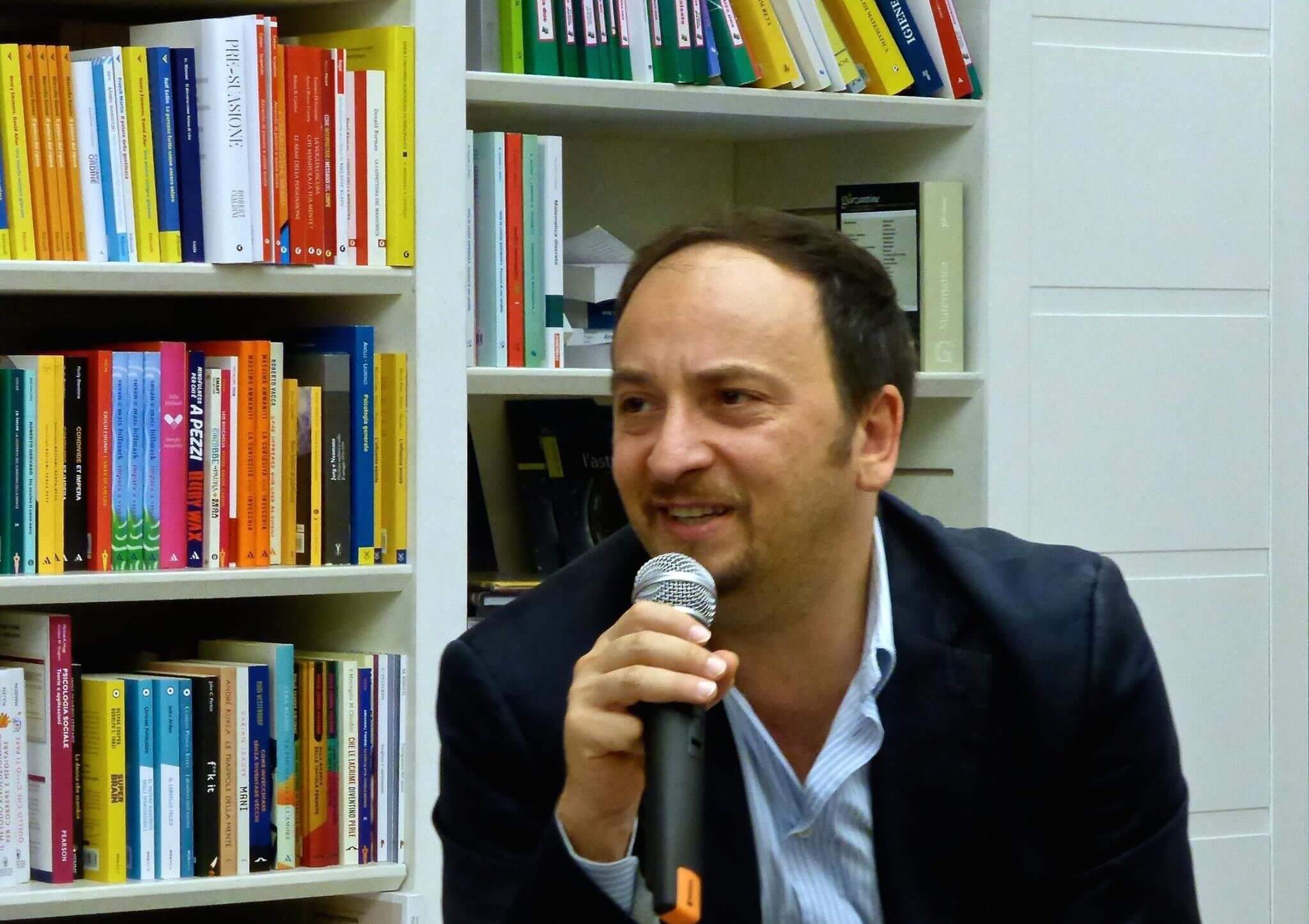
William Vastarella © Vito Signorile
For more about lifestyle in Croatia, follow TCN's dedicated page.


